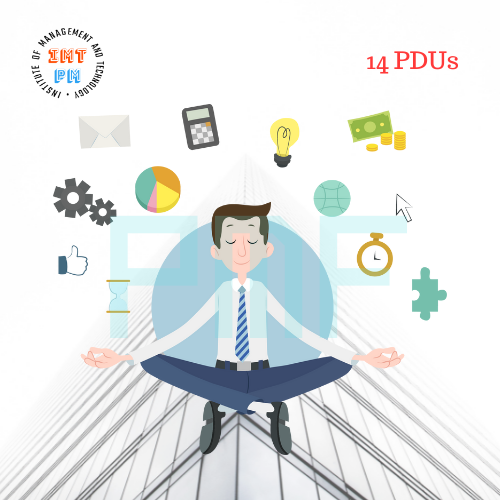Description
Provided by PMI® A.T.P. #4760.
All PMP, PgMP, CAPM certification holders earn 14 PDUs of Technical Project Management after taking this course.
All PMI-PBA certification holders earn 1 PDUs of Technical Project Management after taking this course.
All PMI-RMP certification holders earn 2 PDUs of Technical Project Management after taking this course.
All PMI-SP certification holders earn 1.25 PDUs of Technical Project Management after taking this course.
This course is designed to help you have a core understanding of Project Management Body of Knowledge (PMBOK®) developed by the Project Management Institute (PMI®) to manage projects in your organizations effectively and efficiently.
When taking in this course, you will:
- Know the main principles of project initiating, planning, executing, controlling and closing.
- Know 49 project management processes categorized in 5 process groups and ten knowledge areas.
- Be able to establish project baseline comprising of scope baseline, schedule baseline, and cost baseline.
- Be able to handle the potential impact of risks.
- Be familiar with, and able to use, Earned Value Management to monitor and control projects.
- Know the conflict-handling techniques and motivation theories and be able to apply them to your projects.
Course reviews on PMI®: https://ccrs.pmi.org/search/course/491662
LESSONS:
Chapter 1: FOUNDATIONAL ELEMENTS AND THE ROLE OF THE PROJECT MANAGER.
In this chapter, we will go through an overview of a guide to the project management body of knowledge, foundational elements of project management, the environment in which projects operate, and the role of the project manager.
Chapter 2: PROJECT INTEGRATION MANAGEMENT
Project Integration Management includes the processes and activities to identify, define, combine, unify, and coordinate the various processes and project management activities within the Project Management Process Groups. In the project management context, integration includes characteristics of unification, consolidation, communication, and interrelationship.
Chapter 3: PROJECT SCOPE MANAGEMENT
Project Scope Management includes the processes required to ensure that the project includes all the work required, and only the work required, to complete the project successfully. Managing the project scope is primarily concerned with defining and controlling what is and is not included in the project.
Chapter 4: PROJECT SCHEDULE MANAGEMENT
The project schedule is the tool that communicates what work needs to be performed, which resources of the organization will perform the work and the timeframes in which that work needs to be performed.
Chapter 5: PROJECT COST MANAGEMENT
Project Cost Management is a method that uses technology to measure cost and productivity through the full life-cycle of enterprise-level projects. Project Cost Management encompasses several specific functions of project management including estimating, job controls, field data collection, scheduling, accounting and design.
Chapter 6: PROJECT QUALITY MANAGEMENT
Project Quality Management includes the processes for incorporating the organization’s quality policy regarding planning, managing, and controlling project and product quality requirements in order to meet stakeholders’ objectives. Project Quality Management also supports continuous process improvement activities as undertaken on behalf of the performing organization.
Chapter 7: PROJECT RESOURCE MANAGEMENT
Project Resource Management includes the processes to identify, acquire, and manage the resources needed for the successful completion of the project. These processes help ensure that the right resources will be available to the project manager and project team at the right time and place.
Chapter 8: PROJECT COMMUNICATIONS MANAGEMENT
Project Communications Management includes the processes necessary to ensure that the information needs of the project and its stakeholders are met through the development of artifacts and the implementation of activities designed to achieve effective information exchange. Project Communications Management consists of two parts. The first part is developing a strategy to ensure communication is effective for stakeholders. The second part is carrying out the activities necessary to implement the communication strategy.
Chapter 9: PROJECT RISK MANAGEMENT
Project Risk Management includes the processes of conducting risk management planning, identification, analysis, response planning, response implementation, and monitoring risk on a project. The objectives of project risk management are to increase the probability and/or impact of positive risks and to decrease the probability and/or impact of negative risks, in order to optimize the chances of project success.
Chapter 10: PROJECT PROCUREMENT MANAGEMENT
Project Procurement Management includes the processes necessary to purchase or acquire products, services, or results needed from outside the project team. Project Procurement Management includes the management and control processes required to develop and administer agreements such as contracts, purchase orders, memoranda of agreements (MOAs), or internal service level agreements (SLAs). The personnel authorized to procure the goods and/or services required for the project may be members of the project team, management, or part of the organization’s purchasing department if applicable.
Chapter 11: PROJECT STAKEHOLDER MANAGEMENT
Project Stakeholder Management includes the processes required to identify the people, groups, or organizations that could impact or be impacted by the project, to analyze stakeholder expectations and their impact on the project, and to develop appropriate management strategies for effectively engaging stakeholders in project decisions and execution. The processes support the work of the project team to analyze stakeholder expectations, assess the degree to which they impact or are impacted by the project, and develop strategies to effectively engage stakeholders in support of project decisions and the planning and execution of the work of the project.
Chapter 12: CODE OF ETHICS AND PROFESSIONAL CONDUCT
As practitioners of project management, we are committed to doing what is right and honourable. We set high standards for ourselves and we aspire to meet these standards in all aspects of our lives at work, at home, and in service to our profession.







Reviews
There are no reviews yet.